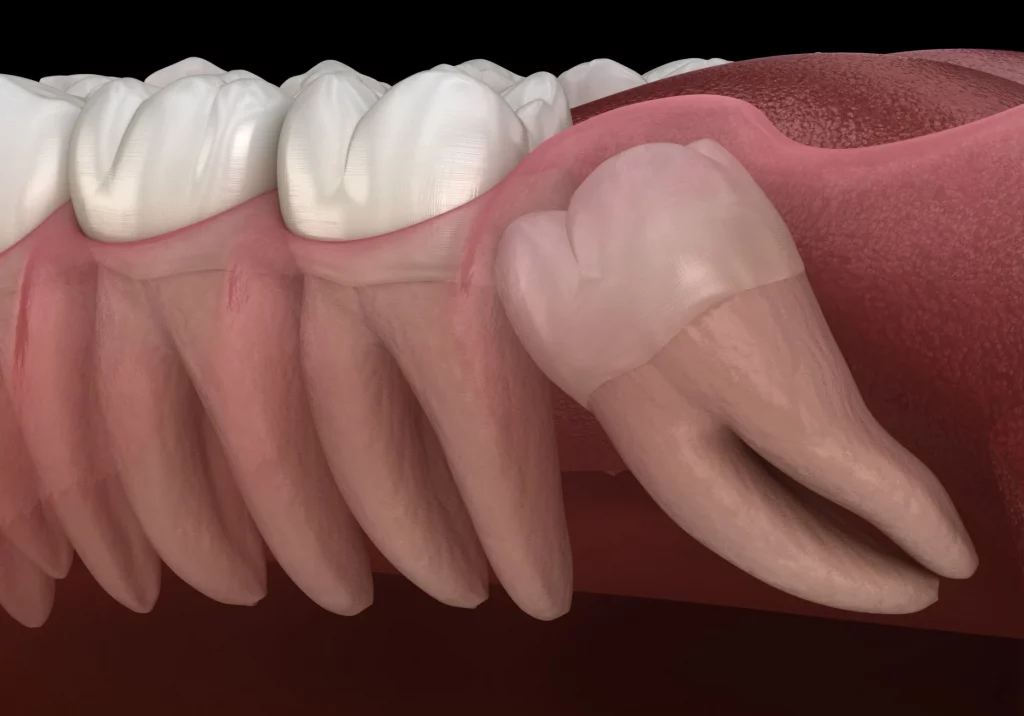If your dentist has suggested removing your wisdom teeth, they have a compelling reason. Your dentist will not recommend surgically removing your wisdom teeth without considering the benefits and drawbacks. However, you should always consider the alternatives when considering invasive oral surgery. There are two likely scenarios if you have been referred to Warren Oral Surgery for wisdom teeth removal – either you have an impacted or infected wisdom tooth that must come out, or your dentist is being proactive by having your wisdom teeth removed before they become a health concern.
Some individuals do not need to remove their wisdom teeth because they are healthy, have fully erupted, and do not pose a problem with other teeth. However, this is rare. For many patients who put off having their third molars (wisdom teeth) removed, complications arise later in life.

OVERCROWDING
Humans have evolved over centuries, and their mouths have evolved as well. We have drastically changed our diets over time and no longer need the third molars to grind foods. As a result, our mouths have become smaller, often crowding the wisdom teeth. This can lead to impacted teeth that do not come in fully, crowding of the adjacent teeth, and teeth that overlap or shift out of place. This overcrowding can lead to bite problems and difficulty keeping your molars clean.
IMPACTION
Impacted wisdom teeth are trapped in the gum line and cannot fully erupt. Severely impacted wisdom teeth may shift to a horizontal position in the jawbone or turn completely around, making it difficult to open and close your mouth. When this happens, the wisdom teeth can cause severe pain. They are also more likely to develop infections or abscesses. In turn, the wisdom teeth may develop tooth decay or lead to resorption of the surrounding, healthy teeth.
TOOTH DECAY
Wisdom teeth are in the back of the mouth, where they are often difficult to reach and care for properly. This leads to bacterial growth, gingivitis, cavities, and the potential for infection of adjacent teeth. Unfortunately, by the time cavities are discovered in wisdom teeth, the infection has often caused jawbone deterioration or disease. Extraction is likely the best remedy but is more difficult as you grow older.
DIFFICULT REMOVAL
If you keep your wisdom teeth, they may cause problems years later. Patients who develop an impacted wisdom tooth in their thirties or forties will likely have a more difficult recovery from oral surgery. The aging process slows healing, and the roots of wisdom teeth will have grown longer. Removing these longer roots can be difficult, requiring more invasive surgery. It can also be more complex because the roots may have impinged on nerve bundles in the jawbone.
Having your wisdom teeth removed before a problem develops is often the best way to protect yourself from issues later in life. Your dentist may advise having your wisdom teeth removed while you are in your teens or twenties to stave off any problems in the future and minimize the chance of complications.
SIGNS YOU MAY NEED YOUR WISDOM TEETH REMOVED
Your dentist or one of our oral surgeons can evaluate your wisdom teeth to determine whether you are at risk of complications. However, some signs of wisdom teeth issues should never be ignored. If you experience any of these symptoms for more than two weeks, contact your dentist or Warren Oral Surgery immediately:
- Severe tooth pain
- Gum infections around the wisdom teeth
- Abscess or tumor in the jawbone
- Gum disease
- Extreme tooth decay
- Swelling or pain in the cheeks, jaw, or around the eyes
- Chronic headaches
- Unexplained bad breath even after brushing
- Cracks in the nearby teeth
Warren Oral Surgery’s doctors are experienced in evaluating and removing wisdom teeth. If you have any of the symptoms above or want to avoid future complications from your wisdom teeth, contact our office at 908-222-7922 or use our simple online booking form to arrange a wisdom teeth evaluation.
Are you or your loved one suffering from Wisdom Tooth pain?
Posted by cpond on Jan 17th, 2023 1:22 pm.
Comments are closed.
